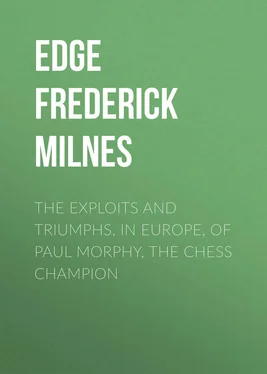Frederick Edge - The Exploits and Triumphs, in Europe, of Paul Morphy, the Chess Champion
Здесь есть возможность читать онлайн «Frederick Edge - The Exploits and Triumphs, in Europe, of Paul Morphy, the Chess Champion» — ознакомительный отрывок электронной книги совершенно бесплатно, а после прочтения отрывка купить полную версию. В некоторых случаях можно слушать аудио, скачать через торрент в формате fb2 и присутствует краткое содержание. Жанр: Развлечения, foreign_antique, foreign_prose, на английском языке. Описание произведения, (предисловие) а так же отзывы посетителей доступны на портале библиотеки ЛибКат.
- Название:The Exploits and Triumphs, in Europe, of Paul Morphy, the Chess Champion
- Автор:
- Жанр:
- Год:неизвестен
- ISBN:нет данных
- Рейтинг книги:4 / 5. Голосов: 1
-
Избранное:Добавить в избранное
- Отзывы:
-
Ваша оценка:
- 80
- 1
- 2
- 3
- 4
- 5
The Exploits and Triumphs, in Europe, of Paul Morphy, the Chess Champion: краткое содержание, описание и аннотация
Предлагаем к чтению аннотацию, описание, краткое содержание или предисловие (зависит от того, что написал сам автор книги «The Exploits and Triumphs, in Europe, of Paul Morphy, the Chess Champion»). Если вы не нашли необходимую информацию о книге — напишите в комментариях, мы постараемся отыскать её.
The Exploits and Triumphs, in Europe, of Paul Morphy, the Chess Champion — читать онлайн ознакомительный отрывок
Ниже представлен текст книги, разбитый по страницам. Система сохранения места последней прочитанной страницы, позволяет с удобством читать онлайн бесплатно книгу «The Exploits and Triumphs, in Europe, of Paul Morphy, the Chess Champion», без необходимости каждый раз заново искать на чём Вы остановились. Поставьте закладку, и сможете в любой момент перейти на страницу, на которой закончили чтение.
Интервал:
Закладка:
The question has frequently been asked, whether and how Mr. Lewis played Labourdonnais? They played together on three different occasions, in all seven games , of which Labourdonnais won five and lost two. The first time they met was at the house of Mr. Domitt, Hon. Sec. of the London Club, and two Allgaier Gambits were played, each winning one. As they had just done their duty to a very good dinner, and society was then divided into two, three, and four bottle men, Labourdonnais remarked, "The victory is not likely to be gained by the better player, but by him who carries his wine best." This reminds me of a bon mot of Mr. Boden. Somebody remarked in his presence that two amateurs (whose names to mention "decency forbids") were both drunk, though engaged in a match game: he replied – "Then the best player will win."
After the conclusion of the two games, Messrs. Mercier, Bonfil and Domit, particular friends of the English player, challenged Labourdonnais to play Mr. Lewis a match of twenty-five games at £5 a game. This was rather too bad, considering that Labourdonnais, to use his own words, was "without a friend or a shilling in a foreign country;" but he laughed the challenge away as a joke in his own witty manner, by saying that "in such case he must be the best player who could offer to play for the highest stake," a reply which so pleased a gentleman present, Mr. Brand, that he cried out, "Labourdonnais shall play Lewis a match of 25 games at £10 a game, and I will find his stakes." It is stated that Mr. Brand evinced considerable ill-feeling towards Mr. Lewis, at the time, in consequence of the latter's preferring a move recommended by Mr. Mercier in the match then pending between the London and Edinburgh clubs, to one proposed by himself, and perhaps this was the reason for his offering to back the Frenchman against his own countryman. But Mr. Lewis's friends did not accept the challenge, and the two champions confined their contests to five off-hand games, which were played at the residences of Messrs. Bonfil and Mercier, Lewis winning one and Labourdonnais four, so that the final result was: —
The above occurrences took place on the occasion of Labourdonnais' first visit to London, many years before his famous encounters with McDonnell.
About the year 1830, a gentleman of great parts and education, named Huttmann, finding his share of this world's loaves and fishes not precisely what he could wish, opened a coffee house in Covent Garden. His patrons belonged to what society calls the "upper classes," for his prices were high and his refreshments first-rate; two considerable attractions to men of means. Amongst the frequenters of the rooms were Mr. Henry Russell, the since celebrated singer; Captain Medwin (Byron's medium), and Mr. Mackay, now Dr. Charles Mackay, the poet. Doctor Mackay was in New York during the chess tournament, and visited the rooms on that occasion, but we were then unaware of his early acquaintance with the game.
At Huttman's Coffee House, the habitués were gentlemen in quest of quietness; men of calm, reflective turn, given to chit-chat in nooks and corners; smoking a genuine "Havana" over a cup of unquestionable "Mocha," and reading that everlasting refuge for an Englishman, " The Times ." Just the atmosphere for a chess-board, and two or three were accordingly introduced. Now you can never get chess-boards into any establishment, without the fact becoming immediately known amongst amateurs. Mr. George Walker soon got wind of the arrangement, and forthwith reconnoitred the lines. The result of his observations was that he suggested the formation of a chess club in the first floor rooms, and to this Mr. Huttmann assented. Mr. Walker forthwith began drumming about for recruits; electing himself secretary, pro tem. , he drew up a set of rules, and got out printed circulars, and it was not his fault if any person with whom he claimed even bowing acquaintance, escaped from the meshes of the proposed club. Within a few days he had canvassed all his earliest chess friends, and had rallied round the standard of Caïssa between twenty and thirty defenders. It was resolved to style the association and Captain Medwin was elected the first president.
We are upon classic ground. Who does not remember the feats performed within the walls of this home of the glorious departed? Who shall forget the oft-told wonders of that golden age of chess? Any thing related of the Westminster Club is swallowed with willing faith by gaping acolytes. Those were glorious days, indeed, the Homeric age of zatrikiological worthies! Amongst the early supporters of the Club were the Rev. Mr. D'Arblay, (son of Madame D'Arblay,) Mr. Skelton, (so well known about town as "Dandy Skelton,") Mr. Nixon, organist of the Bavarian Catholic Church, in Warwick Street, Duncan Forbes, Professor of Oriental languages at University College, and many other celebrated literary characters. The proprietor, Mr. Huttman, followed the enterprise with spirit. Every cigar he sold in the coffee-room was wrapt in a printed problem; and, in addition, he published a periodical penny miscellany on chess. Such extraordinary exertions quickly bore fruit, and, in a short time the Club rose to something like fifty members. The room in which the meetings were held became, in consequence, so hot, that it was deservedly styled "the oven."
Emboldened by success, Mr. Huttman began to look about for new and more commodious quarters; these he eventually found on the opposite side of the street. Certain gamblers had there taken a house, and furnished the principal apartments in sumptuous style, for the sole purpose of decoying thither a young foreign nobleman, who, in one night, is said to have lost there upwards of £30,000. The house having served their diabolical ends, was of no further use to them, and Mr. Huttman rented it. Here the Westminster Club was enshrined. Amongst the chief supporters were Mr. George Walker, Hon. Sec.; Mr. B. Smith, M. P.; Albany Fonblanque, Esq., of The Examiner ; Messrs. Perigal, Slous, Popert, McDonnel, and many others from the London Club. In 1833, Labourdonnais and McDonnel played their different matches at these splendid rooms.
By the continued exertions of Mr. George Walker, the number of members was increased to three hundred. What a glorious muster-roll! Why should the "old days" not live again at the West End? Surely the ranks of chess players are not thinned, nor is their strength diminished. Our Löwenthals, Bodens, Birds, Stauntons, Barneses, Buckles, Wormalds, Falkbeers, Briens, Zytogoroskys, Lowes, Hannahs, etc., etc., etc., are worthy descendants of West End men of the olden time, without even enlisting the support of such city magnates as the Mongredieus, Slouses, Medleys, etc., of the ancient and virile London Club. Many members of the Westminster still make love to the nymph Caïssa; such historical names as Slous and Walker for instance. But, in addition to the above-mentioned general officers, we now possess a constantly-increasing rank and file, recruited from the chess-playing militia of schools and private families. Chess is assuming vast proportions in England and America: scarcely a weekly paper of any circulation but gives a column to the game; and certainly no newspaper editor would do so if he did not find it pay. At the West End of London, there now exist two clubs of importance, the old St. George's and the new St. James's; the Philidorean Rooms in Rathbone Place partaking rather of the divan character. Neither of these clubs require proficiency in the game as a passport for membership; and a gentleman receiving the Queen would be just as eligible as the amateur giving it. Surely the advantages offered for increasing one's strength in this intellectual struggle of mind against mind, should be an inducement for young players to enroll themselves in one or the other of these two associations.
Читать дальшеИнтервал:
Закладка:
Похожие книги на «The Exploits and Triumphs, in Europe, of Paul Morphy, the Chess Champion»
Представляем Вашему вниманию похожие книги на «The Exploits and Triumphs, in Europe, of Paul Morphy, the Chess Champion» списком для выбора. Мы отобрали схожую по названию и смыслу литературу в надежде предоставить читателям больше вариантов отыскать новые, интересные, ещё непрочитанные произведения.
Обсуждение, отзывы о книге «The Exploits and Triumphs, in Europe, of Paul Morphy, the Chess Champion» и просто собственные мнения читателей. Оставьте ваши комментарии, напишите, что Вы думаете о произведении, его смысле или главных героях. Укажите что конкретно понравилось, а что нет, и почему Вы так считаете.












